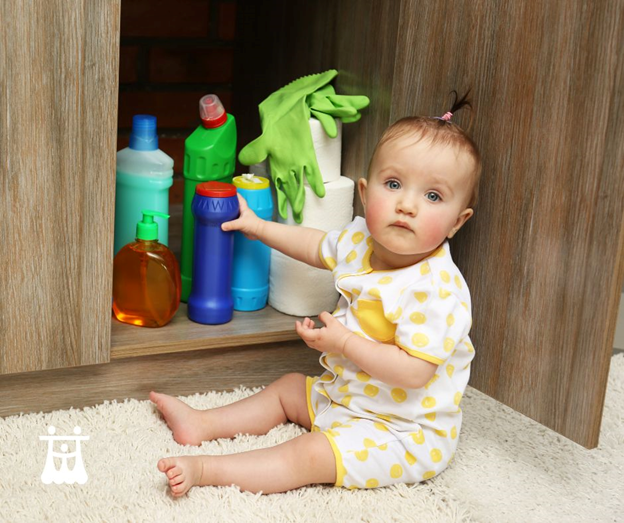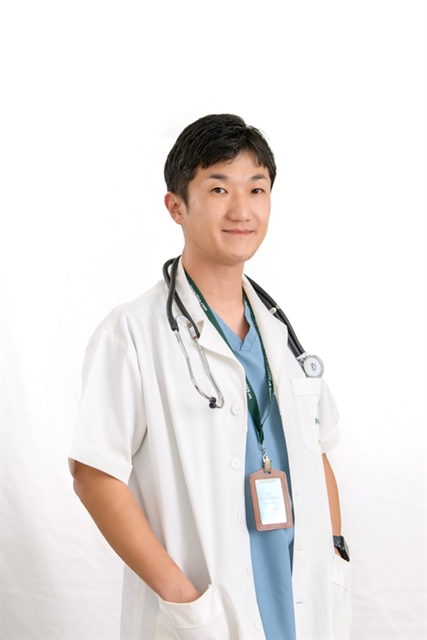Today, we’ll focus on small objects that children might swallow, which can lead to choking or poisoning.
Dr. Kenta Sugiura*
Hiếu is an energetic 18-month-old boy. One day, his three-year-old sister had a fever, so their mother gave her paracetamol syrup. Afterwards, the mother left the medicine on the low table and went to the bathroom. Hiếu was intrigued by the medicine because he saw his sister drinking it, and it looked delicious. The bottle lid was left open, allowing Hiếu to drink the medicine. After returning from the bathroom, his mother noticed that he had taken the entire bottle of paracetamol and rushed him to a medical facility.
The home is full of dangers for children
Homes contain many potential dangers for young children. Sharp objects like kitchen knives and furniture edges can cause cuts or serious injuries from falls, including head trauma. Hot surfaces such as stoves, pots and steam from rice cookers pose burn risks.
Today, we’ll focus on small objects that children might swallow, which can lead to choking or poisoning.
Be careful with all medications
All medications can be toxic if taken in excess. Among the medications used by adults, those for high blood pressure, diabetes and mental disorders can cause serious illness or death in infants, even if only one pill is ingested. Medications prescribed for children can also pose dangers if the dosage is incorrect. As in the case of Hiếu, liquid medications are often formulated to make it easy for children to take them. They are frequently provided in bottles, which increases the risk of accidental overdose.
Do not give honey to children under one year old
Honey poses a serious risk of infant botulism for babies under one year old due to Clostridium bacteria, which can thrive in their immature digestive systems and produce dangerous toxins. These toxins may cause life-threatening muscle paralysis. Since the bacteria are heat-resistant, all forms of honey — whether raw or processed — must be strictly avoided for infants under 12 months of age.
Detergents can cause chemical burns
Accidentally touching or ingesting acidic and alkaline detergents can cause chemical burns, leading to severe inflammation of the mucous membranes in the eyes, mouth, oesophagus and trachea. Even small amounts can result in symptoms such as blindness, intense pain, vomiting or suffocation.

Homes contain many potential dangers for young children. — Photo canva.com
Tobacco causes nicotine poisoning
Cigarettes are among the most common causes of accidental ingestion in children. Nicotine poisoning can lead to symptoms such as agitation, abdominal pain, vomiting and convulsions. The lethal dose is believed to be between half and one cigarette, and ingesting tobacco-soaked liquid can result in rapid absorption into the body, potentially causing severe poisoning symptoms.
Button batteries and magnets can puncture the digestive tract
Button batteries can burn through tissue in 30 minutes and perforate the digestive tract within two hours. Swallowing multiple magnets is equally dangerous—they can attract through intestinal walls, pinching tissues and causing perforation. Both require emergency medical attention.
In the case described at the beginning of this article, Hiếu had ingested a toxic dose of paracetamol and was promptly treated at the hospital. He was admitted to the paediatric intensive care unit, where he received intravenous fluids and oral N-acetylcysteine, an antidote, while being monitored for any abnormalities. Fortunately, his condition did not worsen to a severe level that would necessitate haemodialysis or liver transplant, but he required a one-week hospital stay.
Parents and caregivers can protect children from accidental poisoning by maintaining a safe home environment. Please store all hazardous substances completely out of children's reach.
Important safety considerations:
- Swallowing hazard: Infants can choke on objects smaller than 4cm in diameter
Reach ranges:
• 1-year-olds: ~90cm reach
• 2-year-olds: ~110cm reach
• 3-year-olds: ~120cm reach
We recommend conducting regular safety checks in your home from your child's perspective to identify and eliminate potential dangers. Family Medical Practice

Dr. Kenta Sugiura. — Photo courtesy of Family Medical Practice
*Dr. Kenta Sugiura is a Japanese paediatrician at FMP Hà Nội. Specialising in paediatric emergency care, he treats a wide range of illnesses and injuries. Please consult him with any concerns about your child's health.
FMP Healthcare Group operates medical centres in major cities including HCMC, Hà Nội and Đà Nẵng, offering consultations with international doctors, check-up centres and emergency ambulance services.
Visit FMP Hà Nội 24/7 at 298I Kim Mã Street, Kim Mã Ward, Ba Đình District.
To book an appointment, please call (024).3843.0748, chat via Whatsapp, Viber or Zalo on +84.944.43.1919 or email hanoi@vietnammedicalpractice.com.